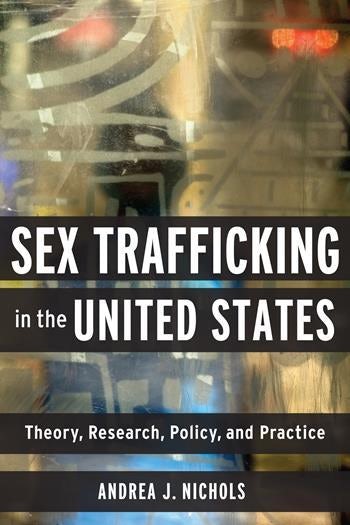Sexual exploitation accounts for approximately 50% of all human trafficking cases, a decrease from 79% in 2006 (UNODC, 2021). Sex exploitation is the main form of exploitation in North, Central and South America, Caribbean, Central and South Eastern Europe, as well as East Asia and the Pacific (see image below) (UNODC, 2021). In Canada, from 2009-2018 "close to two-thirds (63%) of all human trafficking incidents with secondary violations have also involved an offence in relation to sexual services" (Cotter, 2020).
Sources:

Since first encountering the horrors of sexual slavery in a Bosnian refugee camp in 1995, Kara has taken multiple research trips to India, Nepal, Burma, Thailand, Vietnam, the United Kingdom, Italy, the Netherlands, Albania, Moldova, Mexico, and the United States.
With a unique, research-based focus on practice, the book synthesizes the key areas related to working with victims of sex trafficking/ CSE including prevention, identification, practice techniques, and program design as well as suggested interagency, criminal justice, and legislative responses.

Examining the identification of victims, the investigation of cases, victim support, prosecutorial decisions and repatriation practices, the authors draw upon original research from Australia, Serbia and Thailand: three diverse nations that, like nations across the globe, have invested heavily in criminalisation as the dominant response to counter trafficking.

Sex Trafficking in the United States describes how the justice system, activists, and individuals can engage in advocating for victims of sex trafficking. It also offers recommendations for practice and policy and suggestions for cultural change.

Pulling together scholarly information from diverse fields including social work, psychology, and biology, Susan Mapp explores the particular risk factors (such as poverty, child maltreatment, and being a sexual minority) that place children at higher risk for being trafficked.
This volume explores the life experiences, agency, and human rights of trafficked women in order to shed light on the complicated processes in which anti-trafficking, human rights and social justice are intersected. Also available from UFV Library as a print book.
The UFV Library has a vast collection of print and electronic books and videos for students to use for their studies. Remember: when accessing resources off-campus, users will be prompted to enter their UFV credentials to gain access. For tips on starting research and finding videos, check out the links below.
[Note: We are working to improve access to our collections and revising our subject headings to be more respectful and inclusive. Please be aware that you may see certain words or descriptions in search results or library materials which reflect the author’s attitude or that of the period in which the item was created and may now be considered offensive.]
Keywords to try searching for:
![]() Librarian's Tip! Search for phrases within a set of quotes to specify your search (e.g. "sex trafficking")
Librarian's Tip! Search for phrases within a set of quotes to specify your search (e.g. "sex trafficking")
Databases are collections of different types of sources (usually digital) such as:
Try using the databases listed below as a starting point for your research.
The following strategies can be useful to help you search for and choose an academic/scholarly research article
1. Analyze your topic statement for search terms
2. Connect different concepts with "AND"; connect similar (or synonymous) concepts with "OR" You also need to use quotation marks to search complete phrases.
e.g. Sex Trafficking AND Canada
e.g. Sex Trafficking OR Sex Exploitation OR Sex Slavery
3. Use limiters (options on the left or right side of the search results) to narrow your results list such as publication dates, peer-reviewed, and full text
4. Be sure to read the abstracts - they will often reveal enough "clues" to tell you if the article is relevant or not.
5. If you do not find articles that interest you, look at your results. See if there are new words or new search terms that you can use that will help you improve your search.
Users can look for videos from the library homepage, or go to one of the Library's video databases. For more information on finding videos please see our Streaming Videos LibGuide. See below for a sample of related videos:
© , University of the Fraser Valley, 33844 King Road, Abbotsford, B.C., Canada V2S 7M8

